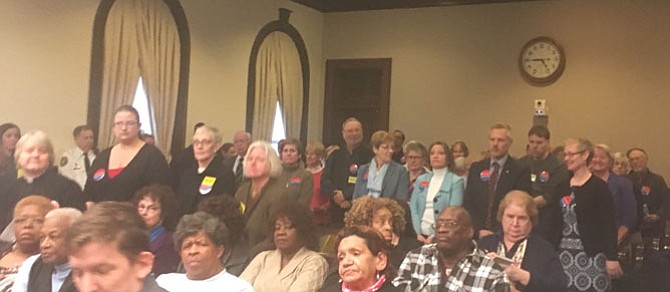Members of Housing Alexandria and VOICE stand at the March 13 public budget hearing to support additional funding for the Episcopal Church of the Resurrection’s proposed affordable housing project. Housing Alexandria and VOICE are two broad-based coalitions, together including nonprofits, religious congregations, and other community institutions and advocates. Photo by Dan Brendel
The future of the Episcopal Church of the Resurrection’s slated affordable housing project hangs in the air while City Council decides on the FY2018 budget.
The congregation feels called by God to give a large part of its church property on the West End over to affordable housing. They say they’ve made some big sacrifices along the way so that their plan — what they call their “bold idea” — might succeed for the community’s benefit.
The bold idea now depends on whether City Council decides to fund a $4.3 million “supplemental” option in the proposed Capital Investment Project budget. If council finds the money, Resurrection’s project will go on to compete for federal subsidies in 2018. If the council does not find the money by May 1, when the budget process ends, the project will not go forward.
“We need our community not to be monolithic, but we’re headed in that direction,” said the Rev. Jo Belser, Resurrection’s pastor. The congregation experiences gentrification directly. Belser says that she and other of her parishioners cannot afford to live in Alexandria.
This is “an opportunity for … effectively a permanent commitment to affordable housing in a place that desperately needs it,” said John Welsh of AHC, the church’s nonprofit developer. “[A]ffordable housing projects … don’t come by every day. And when you have an opportunity to do something like this — when you can get control of a piece of land … with willing partners … — that is going to be a good deal for the city, when the alternative might be dealing with some [for profit] developer who is trying to either … get more density or get out of some other commitment .…”
The $4.3 million in the supplemental CIP would bring the city’s total investment to $8.4 million; Resurrection’s plan includes 113 apartments priced at 40-60 percent of the area median income. The city’s contribution works out to $74,300 per unit. That’s on par with or higher than what it has spent recently on comparable projects, says the Office of Housing.
But Resurrection may represent a longer-term bargain.
“[T]he Beauregard Plan builds [transit] infrastructure first and then deals with the housing,” said Helen McIlvaine of the Office of Housing. “So we would be spending money in the future — and probably spending more money — to create affordability, or to buy units from developers. … [T]he opportunity to actually be creating affordable housing resources ahead of that redevelopment is pretty great. … [I]t wouldn’t have happened without a partner like the church that was willing to say, ‘We’ll look at this use [for our land].’ … They probably could have had lots of other suitors and plans, so the fact that they’re … helping this to happen is remarkable.”
Resurrection’s “bold idea” began in 2012 with its search for a new pastor. To call the right person, they wanted to clarify their vision for the future. At that time the congregation “felt old and tired,” said Belser, whom they ended up hiring. They projected a deficit amounting to about a third of a typical annual budget. The congregation brainstormed 21 ideas about how to survive. Most had to do with internal cuts or consolidation. But one idea stood out. Why not leverage the value of the property to build some affordable housing? The proceeds could help stabilize the church’s finances, while at the same time advancing its historic commitment to social justice.
When the idea came to its first congregational vote, it passed with 96 percent approval. “[T]hat 96 percent of a congregation would agree about anything is a rarity. I had less unanimity about the color of the carpet in the church,” said Belser. At first, the congregation “glommed on to the idea that … we would get a lot of money out of it and the money would save us.” But eventually the dominant narrative shifted to community-oriented “mission.” Even after sale price expectations shrank, the bold idea passed a second vote with 86 percent approval.
The focus on mission in turn reinvigorated congregational life, said parishioners Betsy Faga and Kat Turner. They serve together on the church’s ad hoc redevelopment committee. More people started attending and getting involved in outreach ministries, and outreach ministries multiplied.
“[W]hat I think is the crux of the story from our perspective is that it started out as … ‘How can we save ourselves?’ And along the way it became, ‘What can we do for our community?’ And by doing that, by changing that focus, we’ve managed to save ourselves,” said Turner.
Still, the congregation is aware of what it has sacrificed. Some of the cost is measured in personal terms. The present church facility has been around for 52 years, and many people are emotionally connected to it. “[T]hey’ve worshipped there a long time, it’s embedded in their soul,” said Belser. Turner, a member since 1984, baptized her daughter there.
Some of the cost is measured in terms of ministries. Three other congregations — a Spanish-speaking Pentecostal group, an English-speaking Pentecostal group, and an Ethiopian Evangelical group —u se Resurrection’s building. The church is also one of three distribution points for ALIVE!’s Last Saturday Food Distribution program. Resurrection will not be able to continue these activities due to lack of space in its new facilities.
Some of the cost is measured in dollars. One option presented to the church included “a smaller affordable building of 70-80 units and a strip of about 14 market rate townhomes,” said Turner in an email. Because of the more lucrative townhomes, this configuration could have fetched on the order of $6.9 million. But the church chose to maximize affordable housing rather than value, setting a target of no fewer than 100 units. For its current proposal of 113 all affordable units, the church would get $4.1 million for a 65-year lease of its land. The money would buy a smaller, mortgage-free, and less maintenance-burdened church facility adjacent to the apartment complex and a new parking access road.
$4.1 million is the bottom limit. In a letter, the Rt. Rev. Shannon Johnston, the bishop of the Episcopal Diocese of Richmond — the clerical authority who ultimately owns the land and approves any deal — applauds the congregation’s commitment. Though he worries that any lower price poses too great a risk to the future of the church and its ministry.
The church has also invested $20,000 so far in unrecoverable costs. “[T]hese figures would have been higher except that we have benefited from a number of pro bono and low bono arrangements with fellow Episcopalians who support our project,” said Turner in an email.
Overall, Belser has “no complaints about the city.” She acknowledges the city’s commitment despite design setbacks and delays. “The city wants to provide affordable housing. And if our project’s worthy of that … they’re going to do what they can …. Now, they’ve got a lot of other things that are competing against that, and they’re going to have to figure that out.”

